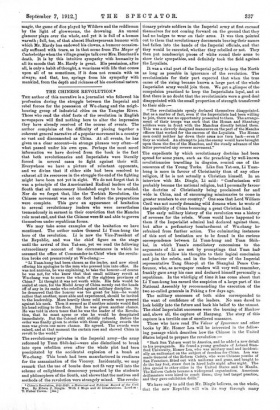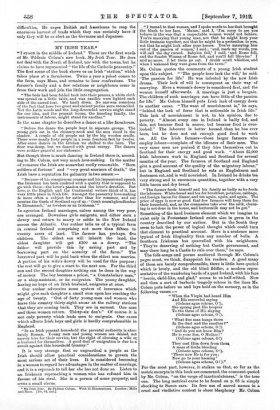THE CHINESE REVOLUTION.* TEE author of this narrative is a
journalist who followed his profession during the struggle between the Imperial and rebel forces for the possession of Wu-chang and the neigh- bouring group of industrial cities on the Yangtse River.
Those who read the chief facts of the revolution in English newspapers will find nothing here to alter the impression they have already received of the course of events. The author complains of the difficulty of piecing together a coherent general narrative of a popular movement in a country so vast and disconnected as China. At all events, he has given us a clear account—in strange phrases very often—of what passed under his own eyes. Perhaps the most novel information we have derived from the book is the fact that both revolutionaries and Imperialists were literally forced in several cases to fight against their will. Everywhere we have a picture of reluctant opponents, and we divine that if either side bad been resolved to exhaust all its resources in the struggle the end of the fighting might have been not yet in sight. We do not forget that it was a principle of the Americanized Radical leaders of the South that all unnecessary bloodshed ought to be avoided. Nor do we forget that, like the Turkish Revolution, the Chinese movement was set on foot before the preparations were complete. This gave an appearance of hesitation to several revolutionary leaders who were nevertheless tremendously in earnest in their conviction that the Manchu rule must end, and that the Chinese were fit and able to govern themselves under republican forms.
We may take some examples of the hesitation we have mentioned. The author makes General Li Yuan-hung the hero of the revolution. Li is now the Vice-President of the Republic, and was the chief figure on the stage until the arrival of Sun Yat-sen, yet we read the following extraordinary account of the circumstances in which he assumed the office of Commander-in-Chief when the revolu- tion broke out prematurely at Wu-chang
" Li Yuan-hung had been chosen as the leader, and now stood offering his apologies to the men who pressed him into office. He was not anxious, he was explaining, to take the honour—of course he was not, for who knew that that small military revolt at Wu-chang was to move the whole of the eighteen provinces of China ? Li thought it was not worth while. His fate would be sealed at once, for the Model Army of China merely cut the heads off of any in its ranks who rebelled against military discipline. So he demurred that the honour was too great for him—he would rather that another, more able and experienced, should be invited to the leadership. More heavily those cold swords were pressed against his neck. Then it seemed as if another minute would find his head rolling to the floor. But he was given another chance. He was told in stern tones that he was the leader of the Revolu- tion, that he must agree or else he would be decapitated immediately. But the Colonel still stolidly refused. Before the order was finally given to strike with those glistening swords the man was given one more chance. He agreed. The swords were raised, and at that moment the curtain rose and showed China in revolt to the world."
The revolutionary privates in the Imperial army—the army reformed by Yuan Shih-kai—were also disinclined to break into open rebellion even after the whole plot had been precipitated by the accidental explosion of a bomb at Wu-chang. This bomb had been manufactured in readiness for the assassination of the Viceroy. Incidentally, we may remark that the use of bombs does not fit very well into the scheme of enlightened democracy preached by the students and philosophers of the South, and shows that the motives and methods of the revolution were strangely mixed. The revolu-
• China's Revolution, 191/-19/2: a Historical and Political Record of the Civil War. By Edwin J. Dingle. With 2 Kips and 33 Illustrations. London a T. Fisher Unwin. LISs.]
tionary private soldiers in the Imperial army at first excused themselves for not coming forward on the ground that they had no badges to wear on their arms. It was then pointed out to them that revolutionary documents bearing their names had fallen into the hands of the Imperial officials, and that they would be executed, whether they rebelled or not. They then put nondescript pieces of white round their arms to show their sympathies, and definitely took the field against the Loyalists.
It was a vital part of the Imperial policy to keep the North as long as possible in ignorance of the revolution. The revolutionists for their part expected that when the true cause of the rising became known a large part of the wholo- Imperialist army would join them. We get a glimpse of the compulsion practised to keep the Imperialists loyal, and at first there is no doubt that the revolutionists were a good deal disappointed with the small proportion of strength transferred' to their side :—
"The revolutionists openly declared themselves disappointed. But as a matter of fact, even if the Imperialists had been willing- to join, there was no opportunity presented to them. The arrange- ment of their troops was such that the Honan and Shantung soldiers were in front with the Manchus directly behind them. This was a cleverly designed manoeuvre on the part of the Manchu officers that worked for the success of the Loyalists. The Honan men could neither lay down their arms nor turn back—even if they so wished. An attempt to join the enemy would have brought upon them the fire of the Manchus, and the steady advance of the latter prevented any reverse movement."
The expedients by which revolutionary doctrine had been spread for some years, such as the preaching by well-known revolutionaries travelling in disguise, remind one of the resources of the Young Turks. Like Sun Yat-sen, Li Yuan- hung is more in favour of Christianity than of any other religion, if he is not actually a Christian himself. In an interview with Mr. Dingle, Li said : " Confucianism will probably become the national religion, but I personally favour the doctrine of Christianity being proclaimed far and wide in China, and of encouraging missionaries to come in greater numbers to our country." One sees that Lord William• Cecil was not merely dreaming wild dreams when he wrote of the possibility of China becoming a great Christian land.
The early military history of the revolution was a history of reverses for the rebels. Worse would have happened to them if the Imperialist admiral had declared against them, but after a perfunctory bombardment of Wu-chang he refrained from further action. The culminating instances of this sort of hesitation are to be found in the curious correspondence between Li Yuan-hung and Yuan Shill- kai, in which Yuan's conciliatory concessions to the arguments of Li are met by promptings that Yuan had much better follow his thoughts to their logical conclusion and join the rebels, and in the behaviour of the Imperial representative Tang Shao-yi at the Shanghai Peace Con- ference, who, as newspaper readers will very well remember.
frankly gave away his case and declared himself personally at. republican. In the whirligig of time it has come about that Li Yuan-hung has earned the suspicion of a large part of the National Assembly by recommending the execution of the two so-called generals in Peking a few days ago.
The military successes of both sides corresponded to the want of confidence of the leaders. No man dared to look boldly into the future and back his belief to the utmost. The chief Imperialist successes were the burning of Hankow and, above all, the capture of Hanyang. The story of this capture is a terrible one of unrelieved massacre.
Those who have read The Valour of Ignorance and other books by Mr. Homer Lea will be interested in the follow-
ing passage which describes how the Chinese in the United States helped to prepare the revolution :—
" Back Sun Yat-sen went to America, and he added a new detail to his propaganda. Ho found a young graduate of Leland Stan- ford University, Homer Lea, who was military mad and incident- ally an enthusiast on the subject of freedom for China. Lea was made General of the Reform Cadets, who were Chinese youths of San Francisco, fitted out with uniforms and guns, and taught to do the hay foot, straw foot in hired halls night after night. The idea spread to other cities in the United States and to Manila. The Reform Cadets became a widespread organization. American• drillmasters were hired to coach them; they had target practice, and they gave exhibition drills."
We have only to add that Mr. Dingle believes, on the whole, that the new Republic will win its way through many
difficulties, He urges British and Americans to. reap the enormous harvcst of trade which they can certainly have if only they will be as alert as the Germans and Japanese.







































 Previous page
Previous page